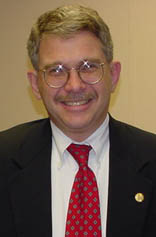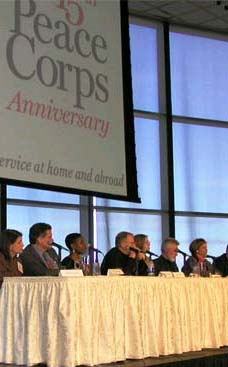2002.10.01: October 1, 2002: Headlines: COS - Kenya: Medicine: FDA: US Medicine: Kenya RPCV Paul Seligman said FDA plans to issue a proposal requiring Bar Coded Labels For Drugs
Peace Corps Online:
Peace Corps News:
Peace Corps Library:
Medicine:
January 23, 2005: Index: PCOL Exclusive: Medicine :
2006.04.18: April 18, 2006: Headlines: COS - Kenya: Medicine: FDA: FDA: Kenya RPCV Paul Seligman, M.D named First Associate Center Director for Safety Policy and Communication in the Center for Drug Evaluation and Research :
2002.10.01: October 1, 2002: Headlines: COS - Kenya: Medicine: FDA: US Medicine: Kenya RPCV Paul Seligman said FDA plans to issue a proposal requiring Bar Coded Labels For Drugs
Kenya RPCV Paul Seligman said FDA plans to issue a proposal requiring Bar Coded Labels For Drugs

FDA held a public meeting at the end of July to get feedback on what should be included in the proposed rule. Dr. Paul Seligman, director of pharmacoepidemiology and statistical science at FDA, said the staff at the department has been reviewing comments since the July meeting. Dr. Seligman said FDA plans to issue a proposal in an expeditious manner and noted that the proposal is a "priority for the department and the [HHS] secretary."
Kenya RPCV Paul Seligman said FDA plans to issue a proposal requiring Bar Coded Labels For Drugs
FDA May Require Bar Coded Labels For Drugs - Mary Ellen Butler
Dr. Paul Seligman
WASHINGTON-In an effort to reduce medication errors, the Food and Drug Administration is developing a proposal to require bar code labeling of pharmaceutical products.
Bar codes are a familiar site to most Americans when they shop at the grocery store, but most single-dose packages of drugs used in hospitals are not bar coded. According to FDA, the lack of a bar code at this stage of the process leads to medication errors at the bedside.
FDA is considering a number of issues as it formulates the regulation including which products should be barcoded, what information the codes should include, what bar code symbols should be used, where the bar code should be placed on the package, and how soon the requirements should become effective.
FDA held a public meeting at the end of July to get feedback on what should be included in the proposed rule. Dr. Paul Seligman, director of pharmacoepidemiology and statistical science at FDA, said the staff at the department has been reviewing comments since the July meeting. Dr. Seligman said FDA plans to issue a proposal in an expeditious manner and noted that the proposal is a "priority for the department and the [HHS] secretary."
He added that since FDA understands it will take some time to implement the rule, officials want to get that process started by making their proposal public as soon as possible.
VA As A Model
The Department of Veterans Affairs, which piloted a bar coding system in the early 1990s at its Topeka, Kans., medical center and instituted the use of the Barcode Medicine Administration System (BCMA) across its nationwide hospital system in June 2000, is serving as a model for FDA during this rulemaking process.
Under VA's system, before medications are dispensed, a nurse scans a patient's wristband with a handheld device and then scans the label on the medicine to ensure the patient is getting the right medication. The system also allows the provider to be sure the patient received the right dose at the right time.
VA's system operates in real time so the providers receive instant updates if there is a change in the patient's medication. VA is now expanding its software to include validation of IV medications, and hospitals are scheduled to implement the new software across VA by Nov. 30.
Kay Willis, chief of pharmacy at the VA medical center in North Chicago, told participants at the July meeting that VA recommends uniform barcode standards that would include the national drug code, lot number and expiration date. In her statement she urged the pharmaceutical industry to adopt uniform barcode standards and to implement the technology as soon as is practical.
Dispute In Details
There is widespread agreement that barcoding should be implemented on drug products in an effort to reduce medication errors, and that FDA regulation will be a way to standardize that process. However, the real debate on this issue seems to exist in the details of the proposal.
For example, one of the issues that the FDA regulation will need to address is what information to include in the bar code. There is general agreement that any barcode should include the National Drug Code (NDC), which contains information on product identification and dosage. In addition, groups like the American Society of Health System Pharmacists (ASHP) are advocating for including not only the NDC, but the lot number and expiration dates.
Kasey Thompson, director of the Center for Patient Safety at ASHP, said the lot number can help identify drug products in a recall and could also be useful in the midst of a public health crisis where mass vaccination or drug treatments were needed. The expiration date is important to keep hospitals from inadvertently administering out-of-date drugs, Thompson said.
However, while providers would like to see lot numbers and expiration dates included, industry groups like the Pharmaceutical Research and Manufacturers of America (PhRMA) say the addition of the last two elements would be too cumbersome for the industry since these numbers would frequently change.
Alan Goldhammer, associate vice president for regulatory affairs at PhRMA, said FDA's initial focus should be on including the NDC only in barcodes. Goldhammer explained that the other elements could be included in the barcode but that the difficulty in printing variable elements would push back the implementation time to as much as five years. However, he said the industry could fully implement barcoding of drugs with only the NDC in three years, and in less time with certain drugs.
Timing is another issue that FDA regulators will need to consider since the regulation will need to specify a timeline for implementation of the requirements. Some groups favor a phased-in approach in which the barcoding with only the NDC would be required in the short-term and lot number and expiration date information would be required at a later time.
However, there are still discrepancies in estimates on how fast the industry could implement any form of barcoding. While PhRMA estimates full implementation of an NDC-only barcode in three years, some provider groups like the American Hospital Association have said that implementation could occur almost immediately with the NDC only and in about a year to 18 months for other variable information.
Other issues will also need to be resolved in the FDA proposal, such as the type of symbols used in the bar code. This will be a challenge because there are a number of symbologies available but some will not fit on the small packages of certain single-dose drugs. In addition, hospitals are concerned that the symbologies used be compatible with current scanning devices.
Thompson said that flexibility in the regulation to allow the use of new technologies will benefit both hospitals and manufacturers. "What hospitals want is something they can use," he said.
When this story was posted in April 2006, this was on the front page of PCOL:





Peace Corps Online The Independent News Forum serving Returned Peace Corps Volunteers
 | The Peace Corps Library
The Peace Corps Library is now available online with over 40,000 index entries in 500 categories. Looking for a Returned Volunteer? Check our RPCV Directory. New: Sign up to receive PCOL Magazine, our free Monthly Magazine by email. Like to keep up with Peace Corps news as it happens? Sign up to recieve a daily summary of Peace Corps stories from around the world. |
 | PCOL readership increases 100%
Monthly readership on "Peace Corps Online" has increased in the past twelve months to 350,000 visitors - over eleven thousand every day - a 100% increase since this time last year. Thanks again, RPCVs and Friends of the Peace Corps, for making PCOL your source of information for the Peace Corps community. And thanks for supporting the Peace Corps Library and History of the Peace Corps. Stay tuned, the best is yet to come. |
 | History of the Peace Corps
PCOL is proud to announce that Phase One of the "History of the Peace Corps" is now available online. This installment includes over 5,000 pages of primary source documents from the archives of the Peace Corps including every issue of "Peace Corps News," "Peace Corps Times," "Peace Corps Volunteer," "Action Update," and every annual report of the Peace Corps to Congress since 1961. "Ask Not" is an ongoing project. Read how you can help. |
 | PC announces new program in Cambodia
Director Vasquez and Cambodia's Deputy Chief of Mission Meng Eang Nay announced a historic new partnership between the Peace Corps and the Kingdom of Cambodia that will bring volunteers to this Southeast Asian country for the first time. Under King Norodom Sihamoni and Prime Minister Hun Sen, Cambodia has welcomed new partnerships with the U.S. government and other U.S. organizations. |
 | Peace Corps suspends program in Bangladesh
Peace Corps Director Gaddi H. Vasquez announced the suspension of the Peace Corps program in Bangladesh on March 15. The safety and security of volunteers is the number one priority of the Peace Corps. Therefore, all Peace Corps volunteers serving in Bangladesh have safely left the country. More than 280 Peace Corps volunteers have served in Bangladesh since the program opened in November 1998. Latest: What other newspapers say. |
 | Invitee re-assigned after inflammatory remarks
The Peace Corps has pulled the invitation to Derek Volkart to join the Morocco Training Program and offered him a position in the Pacific instead after officials read an article in which he stated that his decision to join the Peace Corps was in "response to our current fascist government." RPCV Lew Nash says that "If Derek Volkart spoke his mind as freely in Morocco about the Moroccan monarchy it could cause major problems for himself and other Peace Corps volunteers." Latest: Volkart reverses stance, takes new assignment in Paraguay. |
 | March 1, 1961: Keeping Kennedy's Promise
On March 1, 1961, President John F. Kennedy issues Executive Order #10924, establishing the Peace Corps as a new agency: "Life in the Peace Corps will not be easy. There will be no salary and allowances will be at a level sufficient only to maintain health and meet basic needs. Men and women will be expected to work and live alongside the nationals of the country in which they are stationed--doing the same work, eating the same food, talking the same language. But if the life will not be easy, it will be rich and satisfying. For every young American who participates in the Peace Corps--who works in a foreign land--will know that he or she is sharing in the great common task of bringing to man that decent way of life which is the foundation of freedom and a condition of peace. " |
 | Paid Vacations in the Third World?
Retired diplomat Peter Rice has written a letter to the Wall Street Journal stating that Peace Corps "is really just a U.S. government program for paid vacations in the Third World." Director Vasquez has responded that "the small stipend volunteers receive during their two years of service is more than returned in the understanding fostered in communities throughout the world and here at home." What do RPCVs think? |
 | RPCV admits to abuse while in Peace Corps
Timothy Ronald Obert has pleaded guilty to sexually abusing a minor in Costa Rica while serving there as a Peace Corps volunteer. "The Peace Corps has a zero tolerance policy for misconduct that violates the law or standards of conduct established by the Peace Corps," said Peace Corps Director Gaddi H. Vasquez. Could inadequate screening have been partly to blame? Mr. Obert's resume, which he had submitted to the Peace Corps in support of his application to become a Peace Corps Volunteer, showed that he had repeatedly sought and obtained positions working with underprivileged children. Read what RPCVs have to say about this case. |
 | Why blurring the lines puts PCVs in danger
When the National Call to Service legislation was amended to include Peace Corps in December of 2002, this country had not yet invaded Iraq and was not in prolonged military engagement in the Middle East, as it is now. Read the story of how one volunteer spent three years in captivity from 1976 to 1980 as the hostage of a insurrection group in Colombia in Joanne Marie Roll's op-ed on why this legislation may put soldier/PCVs in the same kind of danger. Latest: Read the ongoing dialog on the subject. |
 | Friends of the Peace Corps 170,000 strong
170,000 is a very special number for the RPCV community - it's the number of Volunteers who have served in the Peace Corps since 1961. It's also a number that is very special to us because March is the first month since our founding in January, 2001 that our readership has exceeded 170,000. And while we know that not everyone who comes to this site is an RPCV, they are all "Friends of the Peace Corps." Thanks everybody for making PCOL your source of news for the Returned Volunteer community. |
Read the stories and leave your comments.

Some postings on Peace Corps Online are provided to the individual members of this group without permission of the copyright owner for the non-profit purposes of criticism, comment, education, scholarship, and research under the "Fair Use" provisions of U.S. Government copyright laws and they may not be distributed further without permission of the copyright owner. Peace Corps Online does not vouch for the accuracy of the content of the postings, which is the sole responsibility of the copyright holder.
Story Source: US Medicine
This story has been posted in the following forums: : Headlines; COS - Kenya; Medicine; FDA
PCOL32504
22



















